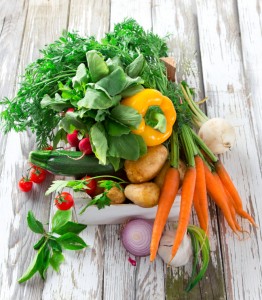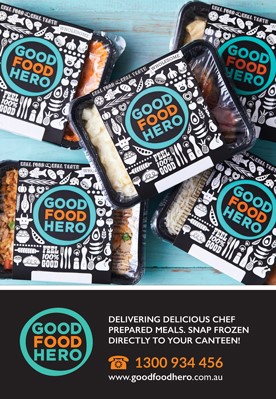Vitamins & minerals
Vitamin means ‘vital for life’. Vitamins and minerals are compounds necessary for the healthy functioning of our bodies. We need vitamins and minerals to help us grow, to see correctly, to form bones, muscles, skin and organs, as well as to help us battle infections. Deficiencies in certain vitamins and minerals can lead to severe problems. The best way to ensure your child receives enough vitamins and minerals for healthy growth and development is to provide a wide variety of fresh foods from the five food groups including whole grain bread and cereals, vegetables, fruit, meat, fish, poultry, eggs, nuts and legumes, and dairy products such as milk, cheese and yoghurt.
Water soluble vitamins
| VITAMIN | What it does for our bodies | Where do we get it from |
|---|---|---|
| B1 (thiamin) | • Helps release energy from carbohydrates • Is needed for proper working of the heart, digestive and nervous systems • Important for growth | • Yeast extracts (e.g. Vegemite) • Wheatgerm and wheat bran • Nuts and seeds • Fortified bread and breakfast cereals • Lean pork • Wholemeal flour and cereals |
| B2 (riboflavin) | • Important for growth and repair of tissues, especially the skin and eyes • Helps release energy from food | • Dairy products (milk, cheese, yoghurt) • Yeast extracts (e.g. Vegemite) • Egg whites • Almonds • Mushrooms • Wholemeal flour and cereals • Green vegetables |
| B3 (niacin) | • Helps to release energy from food • Important for growth • Helps control cholesterol levels • Important for nervous system and digestive health | • Lean meat • Yeast • Bran • Peanuts • Tuna and salmon • Legumes • Fortified breakfast cereals • Eggs • Vegetables • Milk |
| B6 (pyridoxine) | • Helps process protein and carbohydrate • Assists in making red blood cells • Important for brain function and immune system health | • Lean meat and poultry • Fish • Yeast extracts (e.g. Vegemite) • Soybeans • Nuts • Wholegrains • Green leafy vegetables |
| Pantothenic acid | • Helps process carbohydrate, fat and protein for energy • Involved in the formation of fatty acids and cholesterol | • Yeast extracts (e.g. Vegemite) • Fish • Lean meat • Legumes • Nuts • Eggs • Green leafy vegetables • Bread and cereals |
| B12 (cyano-cobalamin) | • Works with folate to produce new blood and nerve cells and DNA • Helps process carbohydrate and fat | • Found only in animal products (lean meat, chicken, fish, seafood, eggs and milk) • Fortified soy products |
| Biotin | • Helps process fat and protein • Important for growth and nerve cell function | • Egg yolk • Oats • Wholegrains • Legumes • Mushrooms • Nuts |
| Folate (folic acid) | • Produces red blood cells and DNA • Keeps the nervous system healthy • Important in early pregnancy to prevent neural tube defects | • Yeast extracts (e.g. Vegemite) • Green leafy vegetables • Wholegrains • Peas • Nuts • Avocado |
| C (absorbic acid) | • Needed for healthy skin, gums, teeth, bones and cartilage • Assists with absorption of some types of iron • Assists with wound healing and resistance to infection | • Fruit and vegetables (citrus fruit and juices, berries, pineapple, mango, pawpaw, capsicum, parsley, broccoli, spinach, cabbage) |
Fat soluble Vitamins
| VITAMIN | What it does for our bodies | Where we get it from |
|---|---|---|
| A (occurs as both retinol and beta-carotene, which is then converted by the body into retinol) | • Essential for eyesight, especially night vision • Essential for normal growth in children • Keeps the skin in the mouth, respiratory tract and urinary tract moist (protects against harmful bacteria) • Builds immunity (ability to fight infections) | Retinol • Oily fish (salmon, sardines, herring) • Full cream dairy products • Butter and table margarine • Egg yolk Beta-carotene • Orange, yellow and green fruits and vegetables (carrots, spinach, apricots, mango, pumpkin, broccoli) |
| D (cholecalciferol) | • Works with calcium and phosphorus to make strong, healthy bones and teeth • A deficiency in Vitamin D can cause rickets, which increases the chance of a child having fractures | • Sunlight (about 10 minutes every day) • Cod liver oil and oily fish (herring, salmon, tuna and sardines) • Fortified margarine • Eggs |
| E (tocopherol) | • This antioxidant may play a role in preventing cancer and heart disease | • Wheatgerm • Vegetable oils and margarine • Nuts and seeds • Eggs • Wholegrains • Fish • Fruit and vegetables |
| K (phylloquinone) | • Essential for blood clotting | • Green leafy vegetables • Broccoli and cauliflower • Eggs • Cheese • Wholemeal flour and bread |
Minerals
| MINERAL | What it does for our bodies | Where we get it from |
|---|---|---|
| Calcium | • Essential for building strong healthy bones and teeth • Helps muscle contraction and nerve function • Helps blood clotting | • Dairy products (milk, cheese and yoghurt) • Canned sardines and salmon with bones • Wholegrains • Tofu and soy fortified drinks • Broccoli • Almonds |
| Chromium | • Helps with normal growth • Plays a role in controlling blood sugar levels | • Yeast extract (vegemite, Marmite) • Egg yolk • Liver and kidney • Lean meat • Wholegrains • Cheese |
| Copper | • Joins with iron in formation of red blood cells • Helps with the functioning of the nervous system | • Oysters, crab, lobster, mussels • Nuts • Yeast extract (e.g. Vegemite) • Wholegrains |
| Fluorine / Fluoride | • Helps with the structure of healthy bones and teeth • Decreases the chance of dental caries • Helps in the prevention of osteoporosis | • Fluoridated drinking water • Fish • Tea |
| Iodine | • Promotes normal thyroid function • Helps brain function and normal growth | • Seafood • Seaweed • Iodised salt • Bread (through iodised salt) |
| Iron | • Helps red blood cells carry oxygen around the body • Prevents anaemia | • Lean red meat, poultry, seafood • Dark leafy vegetables • Fortified breakfast cereals • Wholegrains • Legumes • Eggs |
| Magnesium | • Provides structure for healthy bones • Involved in the release of energy from food • Essential for muscle and nerve function | • Milk • Wholegrains • Green leafy vegetables • Legumes • Lean meats and fish • Nuts and seeds • Bananas |
| Manganese | • Helps in the formation of healthy bones • Helps in the processing of carbohydrates, cholesterol and protein | • Nuts • Wholegrains • Cereals • Vegetables • Oils |
| Phosphorus | • Works with calcium in the formation of strong healthy bones and teeth • Helps the body to store and use energy | Widely available in many foods however the richest sources are: • Meat • Milk and cheese • Eggs • Yeast extract (e.g. Vegemite) • Bran and wheat germ • Nuts and seeds |
| Potassium | • Controls nerve impulses and muscle contractions • Helps maintain fluid balance | • Nuts • Yeast extract, e.g. Vegemite • Dried fruit • Bananas • Bran and wheat germ • Raw fruit and vegetables • Lean meat and fish |
| Sodium/Salt | • Controls nerve impulse transmission • Helps maintain water balance | Foods high in sodium are processed or commercial products: • Table, sea and vegetable salt • Sauces and stocks • Yeast extract, e.g. Vegemite • Processed meats (ham, devon, salami) • Cheese • Bread |
| Zinc | • Aids in wound healing and immune function • Essential for normal taste, smell and sight • Helps in the formation of strong bones | • Lean meat, fish and chicken • Milk • Wholegrains • Legumes and nuts |
If you have concerns about your child’s food intake then please seek advice from your GP or an Accredited Practicing Dietitian.
Sources:
Saxelby, C., 2006. Nutrition for Life 5th ed., Australia.
Stanton, R., 2007 Complete Book of Food and Nutrition, Australia.







